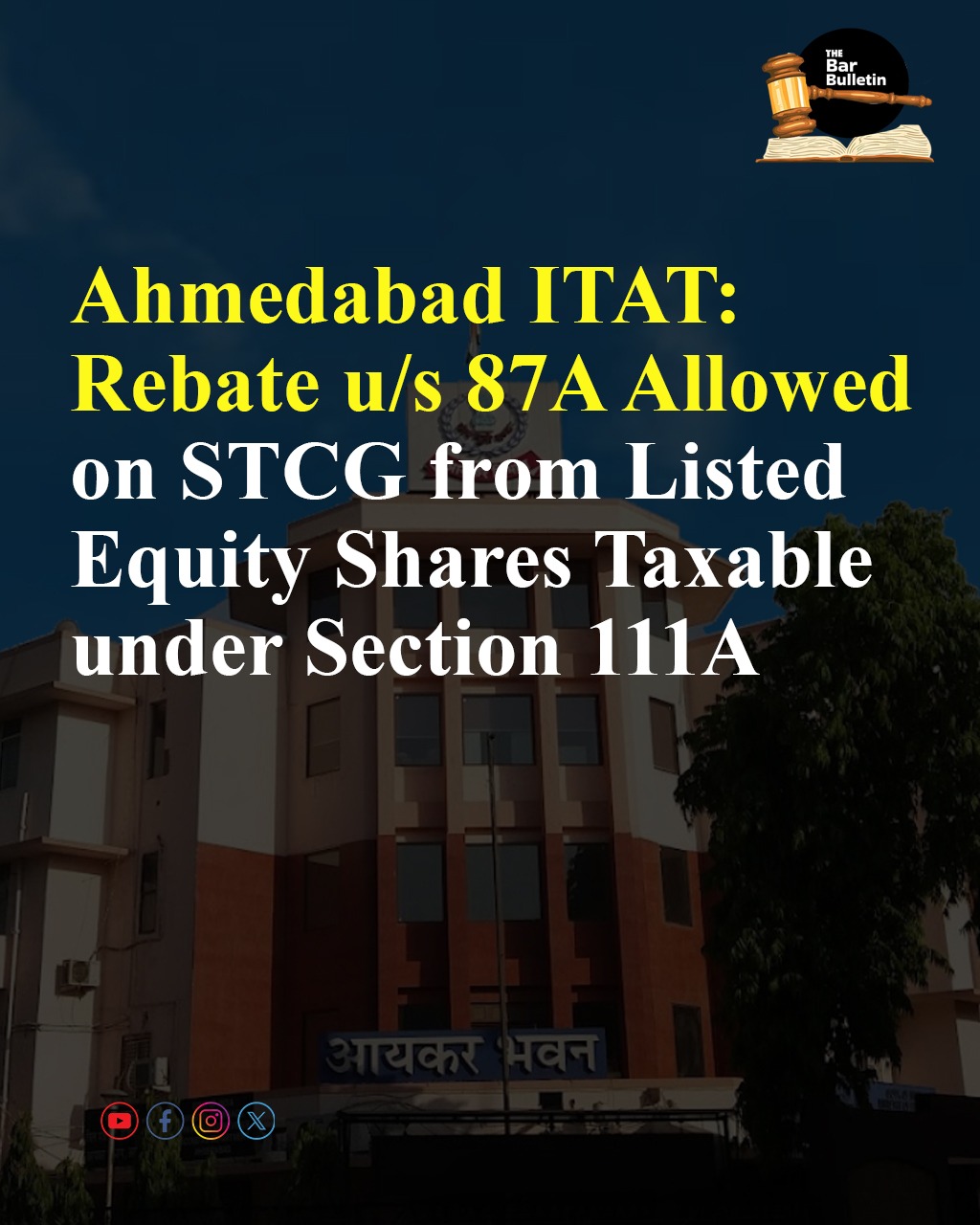The Ahmedabad ITAT recently clarified that Section 87A of the Income Tax Act operates on the total tax computed, whether it includes tax at slab rates or special rates, and applies so long as the total income threshold is met. Therefore, the overriding clause in Section 115BAC(1A), which details the new, default tax regime for individuals and Hindu Undivided Families (HUFs), offering concessional tax rates in exchange for forgoing most tax deductions and exemptions, does not derogate or modify section 87A, unless section 87A itself provides for exclusion.
The Division Bench comprising Suchitra R. Kamble (Judicial Member) and Makarand V. Mahadeokar (Accountant Member) discarded the strong reliance placed by the CIT(A) on the Explanatory Memorandum to the Finance Bill 2025, as per which the rebate under section 87A is not available on tax arising from special rate incomes, including those under section 111A, and clarified that the prospective amendment in the Finance Act 2025 supports the view that under the unamended provision applicable for A.Y. 2024–25, rebate under section 87A cannot be denied merely because tax arises under section 111A.
The Bench clarified from reading of Section 115BAC(1A), that there exists no express bar either in Section 87A or Section 111A for denial of rebate in respect of tax payable on short-term capital gains arising from transfer of listed equity shares taxable at special rates under Section 111A. Since the denial of a rebate under section 87A by the CPC, Bengaluru, appears to be based solely on system-driven logic and not on any statutory mandate, the Bench held the appellant eligible for a rebate under section 87A even though the income includes STCG taxable under section 111A, and accordingly, directed the AO to allow rebate of Rs.13,320/- and recompute tax liability.
In this case, the appellant, an individual resident taxpayer of India, had shown capital gains under Sections 111A & 112A of the Income Tax Act in the old tax regime. However, subsequently, to correct certain omissions in the capital gain schedule, the appellant revised its return and exercised the option under section 115BAC(1A), i.e., to be governed by the default new tax regime, so that she could claim a rebate under Section 87A on Rs. 13,320/- arising solely on account of STCG under section 111A, as her total income was below the threshold of Rs. 7 lacs. The claim of rebate was, however, disallowed, and the tax liability of Rs. 13,319/- was upheld, together with interest under sections 234B and 234C, without specifying any reason or issuing any prior notice for the proposed adjustment.
On appeal, while acknowledging that the first proviso to section 87A permits a rebate for individuals whose total income is chargeable under section 115BAC(1A), the CIT(A) clarified that such computation is expressly made subject to the provisions of Chapter XII, which includes special rate incomes such as STCG u/s 111A and LTCG u/s 112/112A. Therefore, tax on such special incomes cannot be offset or reduced by the rebate under section 87A, even under the new regime.
When the matter reached the ITAT, it was observed that the amended first proviso to section 87A applies to any resident individual whose total income does not exceed Rs. 7 lacs and who is assessed under section 115BAC(1A). The statute does not draw any distinction between normal income and income chargeable at special rates, nor does it contain any express exclusion for tax arising under section 111A.
By contrast, the legislature has inserted an express bar on the availability of the section 87A rebate in section 112A(6), which states that where the total income of an assessee includes any long-term capital gains referred to in sub-section (1), the rebate under section 87A shall be allowed from the income-tax on the total income as reduced by tax payable on such capital gains. The Tribunal therefore observed that the absence of a corresponding clause in section 111A is legally significant and supports the principle that when the legislature intended to deny a rebate in respect of special income (as in section 112A), it has done so expressly. However, in contrast, the absence of any exclusion in section 111A or in section 87A must be construed in favour of the assessee.
Appearances:
Advocate Jagdish Kasodaria, for the Appellant
Advocate Amit Pratap Singh, for the Respondent



